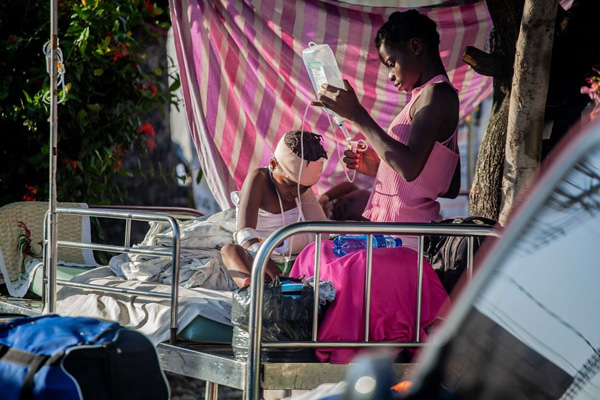Haiti gang violence is significantly impacting their health system as well as starvation rates

[Haiti hospital with a patient and a doctor. Credit to Pixabay]
Recently, Haiti’s capital, Port-au-Prince, was taken over by gangs, spreading throughout the entire country, causing deaths, injuries, and heavily impacting the public health system, as well as leading to widespread starvation.
Although gang violence is not new to the country, its intensity has risen since the assassination of President Jovenel Moïse in 2021, when gangs started gaining more in number, power, and influence.
In late February, Prime Minister Ariel Henry visited Kenya.
Gangs took advantage of this time to band together and start attacking government buildings such as police stations, prisons, and hospitals.
As a result of this, on March 12, Henry announced his resignation after a secure leadership position had been established.
These gangs, however, do not only consist of adults but are now recruiting children as well.
These children, regardless of their beliefs, are restricted from leaving in fear for their lives.
One child interviewed by CNN claimed that these gangs made him burn the bodies of their victims.
He was first brought into one of the gangs when he was 11, homeless, and hungry.
Three years later, he remains trapped and unable to escape due to his mother living far away.
The violence and gunfire have rendered the streets of Port-au-Prince significantly unsafe and risky to travel through.
This gang violence has disrupted the flow of food, water, and gas for civilians, due to unsafe travels, further increasing the prices of such resources.
The situation of food scarcity and hunger is especially at large for Haiti and its civilians.
According to the UN, more than 5 million people in Haiti are at risk of hunger out of the total approximate population of 11.58 million.
Especially due to these violent gangs, there is now very little crop production due to theft, causing people to resort to desperate measures to obtain food.
Hospitals and the public health system have also worsened during this time due to restricted travel and lack of resources.
Gang violence, especially in the streets, has made it nearly impossible for hospitals to transfer patients or medicine from one place to another.
Numerous pharmacies and hospitals have now closed, with rising violence in surrounding neighborhoods causing many staff to evacuate.
These gang members have looted and vandalized numerous medical facilities, taking anything of value.
This situation is especially impactful for pregnant women.
According to an article in the New York Times titled “Haiti’s Hospitals Survived Cholera and Covid.
Gangs are Closing Them”, “about 3,000 women in the Port-au-Prince area will be giving birth in the next month, and 500 of them will have complications.”
This is a dire situation for all civilians in Haiti right now.
According to the United Nations, more than 300,000 civilians have been made homeless due to violent gangs.
Numerous individuals have been caught in the crossfire, with more than 1,500 dead due to gang violence, according to the New York Times.
This has been confirmed by a United Nations officer, as well as several other sources.
A United Nations officer claimed that approximately 5,000 foreign officers will need to be sent to the country to attempt to placate the situation.

- Chaewon Lee / Grade 9
- Seoul Foreign School

![THE HERALD STUDENT REPORTERS [US]](/assets/images/logo_student_us.png)
![THE HERALD STUDENT REPORTERS [Canada]](/assets/images/logo_student_ca.png)
